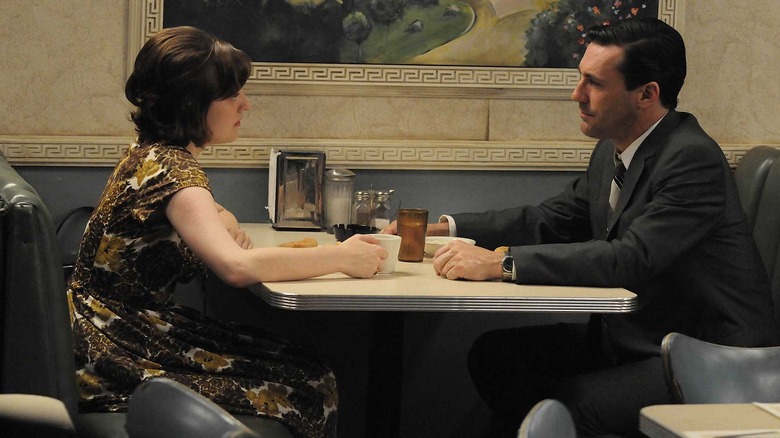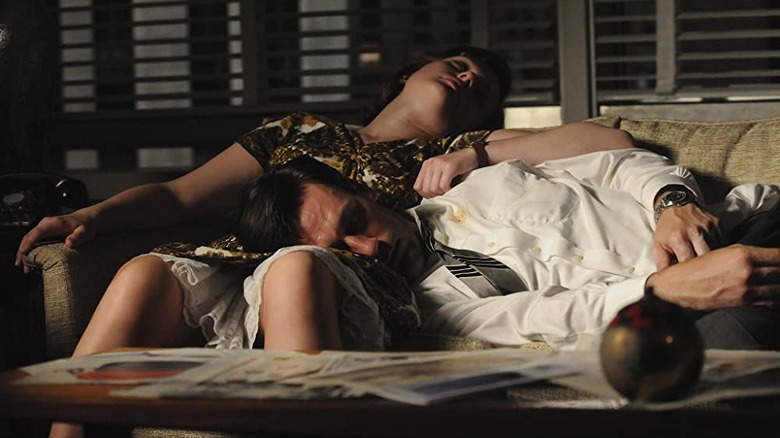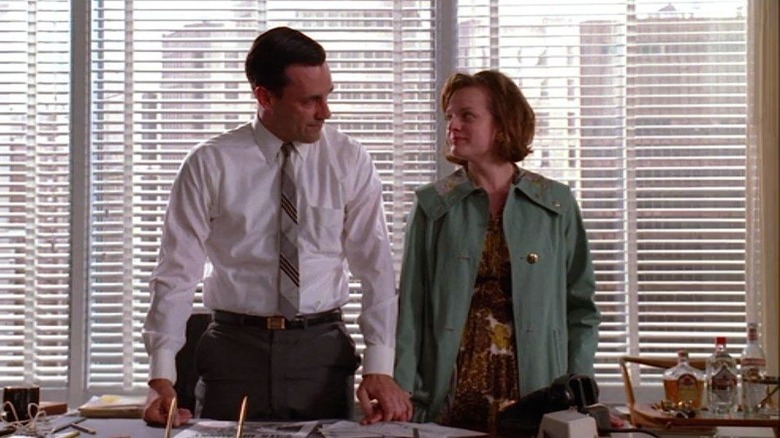One Of Mad Men's Best Episodes Almost Wasn't In The Show
Matthew Weiner had a very specific process for writing "Mad Men." "At the beginning of each season, Weiner would delineate his vision for that season. This would include, as one might expect, general character arcs and plotlines. The writers were also, however, bombarded with images, poetry, movie scenes, dreams, songs, quotes and on," co-writer Semi Chellas told Cornell Sun.
There was one notable exception to Weiner's all-encompassing vision, an episode that would be considered one of the series' greatest: "The Suitcase," season 4, episode 7. Weiner told Vulture "The Suitcase" was "a special script that was not planned at the beginning of the season," adding:
It was an extra episode that really advanced the story, it told the entire relationship of these people."
It also helped save money, "because you're averaging out the price of the sets and the actors and everything over the course of the season," Weiner remarked.
"The Suitcase" is a bottle episode, "a thing that takes place where you limit the elements of the show to one location, with as few people as possible," Weiner told Vulture. This bottle episode strips the series "down to its most essential parts ... to emphasize a theme," The Ringer observed. That theme is the profound and complex relationship between Don Draper and Peggy Olson; they share a rich history and constantly shift platonic roles from mentor and protégé (later in the series, the protégé becomes the mentor), father and daughter, and friends.
The moving "Mad Men" episode feels like a theatrical play in that — with the exception of a stinking appearance from Duck Phillips — it revolves entirely around Don and Peggy's constellation of intense emotions. Let's take a look at why "The Suitcase" is regarded as the peak of Golden Age television.
Don and Peggy reveal their true selves
"The Suitcase" is the ultimate "Mad Men" episode because it explores the show's most compelling relationship with a greater intimacy. Over the course of a single evening, their professional bond deepens to something more personal. We see how Don and Peggy are truly kindred spirits — flawed, damage people who find salvation and self-sabotage in their strong commitment to their creative work.
The episode takes place on the night of the Ali vs. Liston fight in 1965. Don forces Peggy to stay late and think of ideas for the Samsonite ad because he wants to avoid hearing the news that his beloved Anna (the widow of the real Don Draper who became like family to him) has died of cancer. Peggy ends up missing a birthday dinner with her boyfriend, which turns out for the best because instead of a romantic private evening alone, he invited her family, "a bunch of people who drive me crazy."
The hardworking copywriter begins to realize that she may not be suited for a conventional romantic relationship, which Don can easily relate to. As The Ringer writes, "Both Don and Peggy have survived things their more genteel coworkers will never understand — things that give them special insight into the human condition that in turn makes them great at their jobs." Work is what motivates Don and Peggy the most and gives them value.
In the morning after Don and Peggy share a long, winding evening of quarrels, alcohol (which leads to Don vomiting and Peggy awkwardly following him into the men's bathroom), and laughs, ending in the pair falling asleep on one another, he returns the phone call to California and learns that Anna passed away. He is not surprised after seeing a nightly vision of her with a suitcase.
The news hits Don hard and he completely crumples into shuddering sobs. In this instance, Peggy does not see the suave, apathetic Don Draper but the lonely, scared child Dick Whitman. When Peggy comforts him, Don says, "She was the only person in the world who really knew me." Peggy responds, "That's not true." Both Don and Peggy have seen each other at their worst, most vulnerable moments. Throughout season 4, Don has been reeling from his divorce, letting his drinking and philandering infringe on his work life. "The Suitcase" sees Don and Peggy reveal their private selves and openly acknowledge the deep and unique bond they have.
Callbacks to past episodes
Another one of the reasons "The Suitcase" is so incredible is that the Don and Peggy finally address the subtexts of their relationship that have been simmering the past seasons. Matthew Weiner addresses this element of the episode in Vulture: "What I love about this scene was we made a list in the writers' room before this of everything that had not been talked about, because so much of the show depends on people not talking to each other.
They have an explosive argument over the Glo-Coat commercial which features some of the most memorable lines in the show's history. It's also the origin of that hilarious GIF-able quote, "That's what the money's for!" Peggy feels she did not receive enough recognition for her contribution and demands to receive acknowledgement for her diligent efforts. "You gave me 20 ideas and I picked out one of them that was a kernel that became that commercial," Don yells.
Don and Peggy's intense screaming match breaks down their professional walls and allows them to speak more openly with each other and divulge personal secrets. They share the traumas of their past such as Don's military service or how they both witnessed their father's painful deaths. Peggy confesses that the office believes she slept with Don to get her promotion; "They joke about it, like it's so funny because the possibility was so remote." Don kindly replies that Peggy is attractive, but he has rules about the office (rules that he often breaks ...) to which Peggy retorts, "Not as attractive as your other secretaries, I guess," referring to Don's disastrous dalliance with Alison that ended in her tears.
Peggy also reveals her family believes Don is the father of her child. Don quietly asks Peggy if she knows who the father was (she doesn't mention Pete) and if she ever thinks about it. Despite Don's advice that, "This never happened," Peggy sometimes finds herself — particularly at playgrounds — reflecting on her decision. This is the first time they've ever talked about her baby since the hospital.
"The Suitcase" sweetly ends with Don taking Peggy's hand and exchanging a loving look, a silent thank you for being there for him. It's a callback to the first season when Peggy flirtatiously touched Don's hand as a nervous secretary. The episode showcases the most riveting relationship in "Mad Men," and Jon Hamm and Elisabeth Moss deliver knockout performances. It's a moving episode where Don loses the most important platonic female relationship in his life and solidifies a new one.


